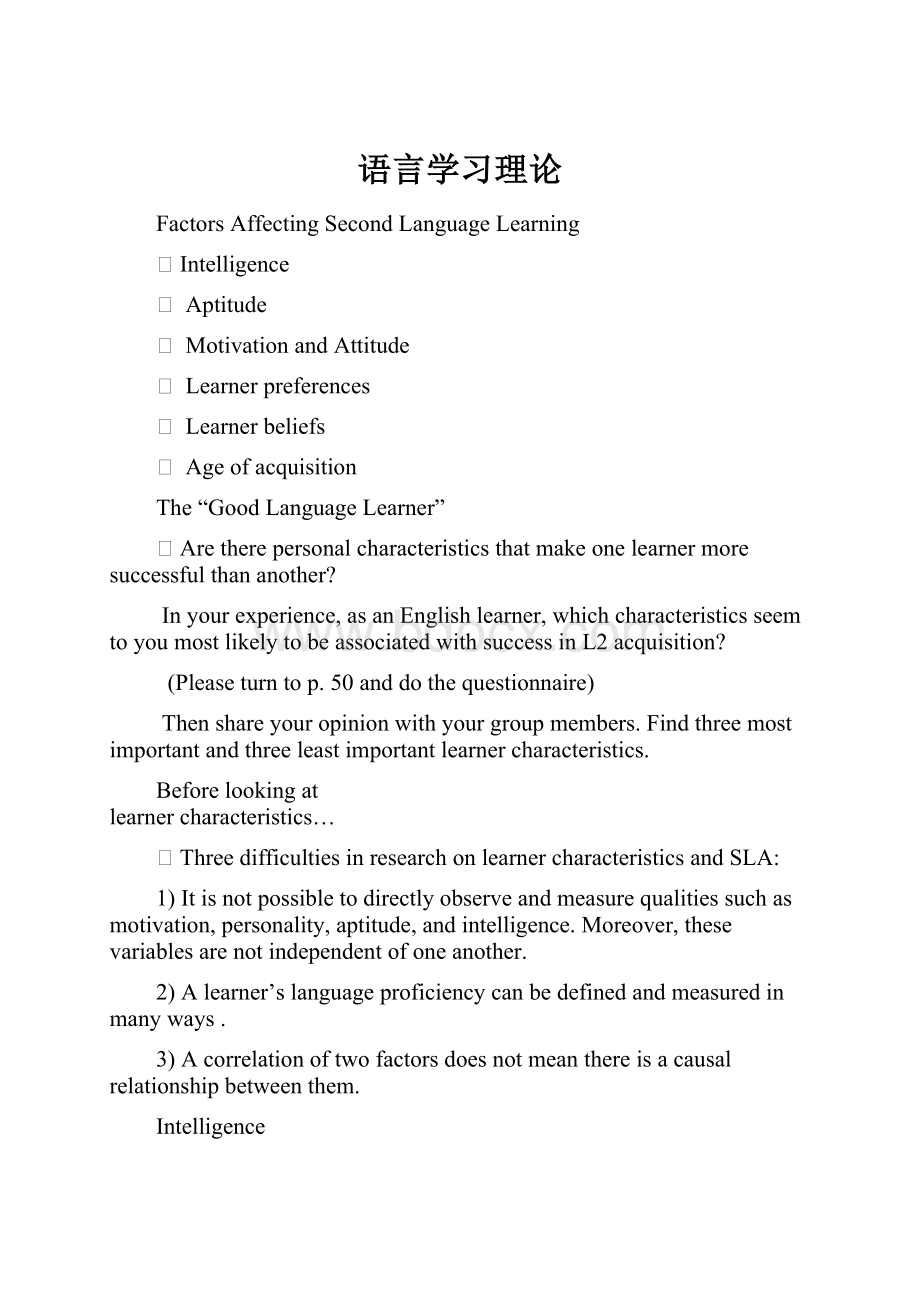语言学习理论.docx
《语言学习理论.docx》由会员分享,可在线阅读,更多相关《语言学习理论.docx(95页珍藏版)》请在冰豆网上搜索。

语言学习理论
FactorsAffectingSecondLanguageLearning
⏹Intelligence
⏹Aptitude
⏹MotivationandAttitude
⏹Learnerpreferences
⏹Learnerbeliefs
⏹Ageofacquisition
The“GoodLanguageLearner”
⏹Aretherepersonalcharacteristicsthatmakeonelearnermoresuccessfulthananother?
Inyourexperience,asanEnglishlearner,whichcharacteristicsseemtoyoumostlikelytobeassociatedwithsuccessinL2acquisition?
(Pleaseturntop.50anddothequestionnaire)
Thenshareyouropinionwithyourgroupmembers.Findthreemostimportantandthreeleastimportantlearnercharacteristics.
Beforelookingat
learnercharacteristics…
⏹ThreedifficultiesinresearchonlearnercharacteristicsandSLA:
1)Itisnotpossibletodirectlyobserveandmeasurequalitiessuchasmotivation,personality,aptitude,andintelligence.Moreover,thesevariablesarenotindependentofoneanother.
2)Alearner’slanguageproficiencycanbedefinedandmeasuredinmanyways.
3)Acorrelationoftwofactorsdoesnotmeanthereisacausalrelationshipbetweenthem.
Intelligence
⏹Intelligencehasmultipletypes.Whatdoyouknow?
⏹Traditionally,intelligencereferstothementalabilitiesthataremeasuredbyanIQ(intelligencequotient)test.Itusuallymeasuresonlytwotypesofintelligence:
verbal/linguisticandmathematical/logicalintelligence.
VerbalIQTest
⏹Areyougoodwiththewrittenandspokenword?
⏹Doyoucommunicatewithstyleorfindyourselfstumblingoveryourwords?
⏹Word“smarts”makesuppartofwhatiscollectivelyknownasintelligence.
⏹Choosethewordthatbestcompletesthesentence.
1. Tobecholericistobe
⏹overweight
⏹bad-tempered
⏹pleasant
⏹sad
⏹Idon’tknow
⏹2. Tohaveaplombistohave
⏹asenseofhumor
⏹insecurity
⏹excessivepride
⏹confidence
⏹Idon’tknow
3. Afecundtreeis
⏹bearinglotsoffruit
⏹changingcolorsforfall
⏹bendinginthewind
⏹driedoutanddying
⏹Idon’tknow
⏹4. Anunctuousattitudeis
⏹insincere
⏹rebellious
⏹friendly
⏹straightforward
⏹Idon’tknow
⏹5. Arepastisa(n)
⏹instantreplay
⏹meal
⏹factory
⏹closerelationship
⏹Idon’tknow
⏹6. Apedagoguehas
⏹patients
⏹enemies
⏹students
⏹servants
⏹Idon’tknow
⏹7. Toincarceratesomeoneisto
⏹imprisonthem
⏹convictthem
⏹accusethem
⏹acquitthem
⏹Idon’tknow
⏹8. Toforgosomethingisto
⏹doittoomuch
⏹becomeboredwithit
⏹seekitout
⏹dowithoutit
⏹Idon’tknow
⏹ 9. Alanguidmovementis
⏹slow-moving
⏹speedy
⏹awkward
⏹reckless
⏹Idon’tknow
⏹10. Aftermanyvicissitudesoffortune,heatlastsunkintoabjectpovertyandhopelessmisery.
⏹hardships
⏹fluctuations
⏹slump
⏹trials
⏹Idon’tknow
Intelligence
⏹Researchfindings:
1.Intelligence,especiallymeasuredbyverbalIQtests,maybeastrongfactorwhenitcomestolearningthatinvolveslanguageanalysisandrulelearning.
2.Ontheotherhand,intelligencemayplayalessimportantroleinlanguagelearningthatfocusesmoreoncommunicationandinteraction.
⏹Conclusions:
3.Itisimportanttokeepinmindthat“intelligence”iscomplexandthatapersonhasmanykindsofabilitiesandstrengths.
4.Anindividualwithstrongacademicperformancedoesnotnecessarilymeanthats/heisasuccessfulsecondlanguagelearner.
Aptitude
⏹Aptitudereferstopotentialforachievement.Anaptitudetestisdesignedtomakeapredictionaboutanindividual’sfutureachievements.
⏹Aptitudeforlanguagelearningisusuallycomposedoffourdifferenttypesofabilities:
1)Theabilitytoidentifyandmemorizenewsounds
2)Theabilitytounderstandthefunctionofparticularwordsinsentences
3)Theabilitytofigureoutgrammaticalrulesfromlanguagesamples
4)Theabilitytomemorizenewwords
⏹Researchfindings:
5)Earlierresearchrevealedasubstantialrelationshipbetweenaptitudeforlanguagelearningandperformanceinforeignlanguagethatwastaughtwithgrammar-translationoraudiolingualmethods.
6)However,aptitudeseemsirrelevanttoL2learningwiththeadoptionofamorecommunicativeapproachtoteaching(i.e.,withafocusonmeaningratherthanonform).
⏹Conclusions:
☐Successfullanguagelearnersarenotnecessarilystronginallofthecomponentsofaptitude.
(e.g.,Somemayhavestrongmemoriesbutonlyaverageabilitytofigureoutgrammaticalrules.)
☐Teacherscanselectappropriateteachingapproachesandactivitiesbasedonlearners’aptitudeprofilestoaccommodatetheirdifferencesinaptitude
Personality
⏹ThereareanumberofpersonalitycharacteristicsthatarelikelytoaffectL2learning,suchas
☐Extroversionvs.introversion
☐Inhibitionvs.risk-taking
☐Self-esteem(self-confidence)
☐Anxiety
☐Empathy
⏹Researchfindings:
☐Somestudieshavefoundthatlearners’successinlanguagelearningisassociatedwithextroversionsuchasassertivenessandadventurousness,whileothershavefoundthatmanysuccessfullanguagelearnersdonotgethighscoresonmeasuresofextroversion.
☐Inhibitionisanegativeforceforsecondlanguagepronunciationperformance.
⏹Researchfindings:
1.Somestudieshavefoundthatlearners’successinlanguagelearningisassociatedwithextroversionsuchasassertivenessandadventurousness,whileothershavefoundthatmanysuccessfullanguagelearnersdonotgethighscoresonmeasuresofextroversion.
2.Inhibitionisanegativeforceforsecondlanguagepronunciationperformance.
1.However,ingeneral,theresearchdoesnotshowaclearlydefinedrelationshipbetweenpersonalityandSLA.Themajordifficultyisidentificationandmeasurementofpersonalitycharacteristics.
2.Personalitymaybeamajorfactoronlyintheacquisitionofconversationalskills(i.e.,oralcommunicativeability),notintheacquisitionofliteracyskills(i.e.,readingandwritingskills).
Motivation&Attitude
⏹Typesofmotivation(intermsofcommunicativeneeds):
PurposeSource
Intrinsic(Internal)
Extrinsic(External)
Integrative
ThelearnerwishestolearnL2forpersonalgrowthandculturalenrichment.
Someoneelse(e.g.,thelearner’sparents)wishesthelearnertoknowL2foranintegrativereason.
Instrumental
ThelearnerwishestoachievepracticalgoalsusingL2(e.g.,foracareer).
ExternalpowerwantsthelearnertolearnL2forapracticalpurpose(e.g.,acorporationasksitsstafftogetlanguagetraining).
⏹Researchfindings:
1)BothintegrativeandinstrumentaltypesofmotivationarerelatedtosuccessinL2learning.MostL2learningsituationsinvolveamixtureofeachtypeofmotivation.
2)Researchstronglyfavorsintrinsicmotivation,especiallyforlong-termretention.Intrinsicallymotivatedlearnersarestrivingforexcellence,autonomy,andself-actualization.
⏹Anindividual’sidentityandattitudestowardsthesecondlanguagecommunity:
☐PositivelearningL2isenrichment.
☐NegativelearningL2isresentment.
⏹SocialdynamicsandpowerrelationshipsbetweenL1andL2.
☐Minoritygroupmemberslearningthelanguageofamajoritygroupsmayhavedifferentattitudesandmotivationfromthoseofmajoritygroupmemberslearningaminoritylanguage.
⏹Motivationintheclassroomsetting:
☐Motivatingstudentsintothelesson.
☐Varyingtheactivities,tasks,andmaterialstoincreasestudents’interestlevels.
☐Usingcooperativeratherthancompetitivegoalstoincreasestudents’self-confidence.
☐Creatingasupportiveandnon-threateninglearningatmosphere.
LearnerPreferences(LearningStyles)
⏹Learningstyle:
Anindividual’snatural,habitual,andpreferredwayofabsorbing,processing,andretainingnewinformationandskills.
⏹TypesoflearningstylesrelatedtoL2learning:
☐Perceptuallearningstyles:
visual,aural/auditory,andhaptic(kinesthetic&tactile)
☐Cognitivelearningstyles:
1)field-independencevs.field-dependence
2)reflectivityvs.impulsivity
3)right-braindominancevs.left-braindominance
⏹Perceptuallearningstyles:
☐Visuallearner:
learnsmoreeffectivelythroughtheeyes(seeing).
☐Auditory(aural)learners:
learnsmoreeffectivelythroughtheears(hearing).
☐Kinestheticlearner:
learnsmoreeffectivelythroughconcretebodyexperience(bodymovement).
☐Tactilelearner:
learnsmoreeffectivelythroughtouch(hands-on).
☐Hapticlearner:
learnsmoreeffectivelythroughtouchandbodymovement(acombinationofthekinestheticandtactilestyles).
⏹Cognitivelearningstyles(I):
field-independencevs.field-dependence
☐Fieldindependentlearnerspickoutthehiddenfiguresinacomplicateddrawingmorequickly.Theytendtoperceiveelementsindependentlyofacontextorfieldandfocusondetails.Theyaremoreanalytical.
☐Fielddependentlearnersaremoreinclinedtoseethewholedrawingandhavedifficultyseparatingitintoparts.Theytendtoperceivethewholefieldorsituationandfocusongeneralmeaning.Theyaremorerelational.
☐Cognitivelearningstyles(I):
field-independencevs.field-dependence
LearnerPreferences(LearningStyles)
⏹Cognitivelearningstyles(II):
reflectivityvs.impulsivity
☐Reflectivelearnerstendtomakeaslower,morecalculateddecision.TheyareusuallymoresystematicandmorecautiousinlearningL2.
☐Impulsivelearnerstendtomakeaquickorgamblingguessatananswertoaproblem.TheyareusuallymoreintuitiveandmorewillingtotakerisksinlearningL2.
⏹Cognitivelearningstyles(III):
right-brainvs.left-braindominance
☐Therightbrainperceivesandremembersvisual,tactile,andauditoryimages.Itismoreefficientinprocessingholistic,integrative,andemotionalinformation.
☐Theleft